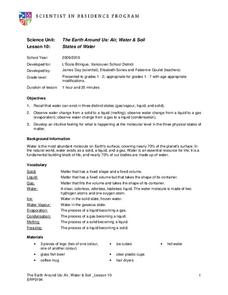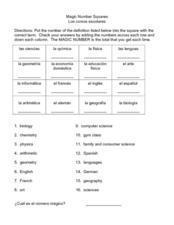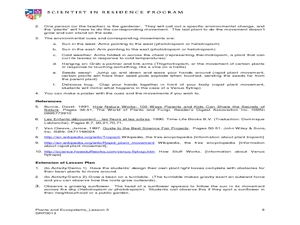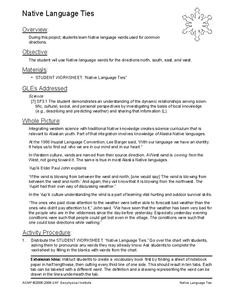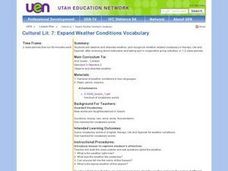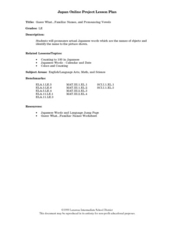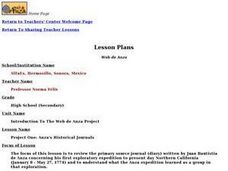Curated OER
Time Expressions with Hacer
The verb hacer has many purposes in the Spanish language, one of which is as part of time expressions. Your class can learn how to use hacer in the preterite, present perfect continuous, and past perfect continuous to express different...
Center for Advanced Research on Language Acquisition (CARLA)
Bringing the Biodiversity of Ecuador to Spanish Immersion Classrooms
Designed for the Spanish Immersion classroom, scholars take a look at biodiversity and Ecuador; all the while, practicing their Spanish with a focus on verbs. In small groups, learners examine photographs of the different climate regions...
Curated OER
Negative Words & Expressions in Spanish
You don't never use double negatives in English, but the grammar is slightly different in Spanish. Help your class grasp this concepts and pick up how to compose sentences that are negative, rather than affirmative with the information...
Curated OER
The Present & Imperfect Progressive
Starting off with present participles, this resource tackles the progressive with grammatical explanations, examples in English and Spanish, and an interactive practice exercise. Use the menu at the top of the webpage to navigate to each...
Curated OER
States of Water
Students investigate the 3 states of matter. In this physical science "matter" lesson plan, students observe and participate in a number of demonstrations involving melting and freezing water. Students observe the effect heat has on...
University of Texas
The Origin of Bone Names
The rib bone's connected to the xiphiod! But, what two Greek words are related to xiphiod? And what do certain Latin terms mean? Build understanding of the bones in the human body as well as Latin and Greek vocabulary with a scavenger...
Curated OER
Plants and Ecosystems
The relationships within and between ecosystems can be explored. after examining an area for living and non-living things students complete the same examination in the forest ecosystem. Students identify abiotic and biotic elements in an...
Curated OER
The Alphabet is Historic: The Roman Alphabet is our Alphabet
Pupils show that the Greeks, Phoenicians and Romans lived in the Mediterranean area. They give reasons why the alphabet was important for the Romans. and say that the Romans developed the alphabet they are learning in school.
Curated OER
Magic Number Squares: School Related Vocabulary
What an innovative way to review Spanish vocabulary! Provided is a chart containing 16 Spanish vocabulary words; their English translations are listed at the bottom of the resource page. The learner matches each translation with its...
Curated OER
Froggy Gets Dressed
Froggy wants to know: what are you wearing? Lead young Spanish learners through a review of weather-related terms before reading the popular children's book Froggy Gets Dressed. Then, using a froggy puppet, discuss what you're...
Curated OER
Plants Alive! How Plants Grow and Move
Students explore how plants move in response to the environment. In this plant lesson, students engage in three different experiments to investigate how plants grow and move. Resources available in English and French.
Curated OER
Quel temps fait-il?
Hit all the basics with this lesson, focusing on weather, greetings, and dates! Start by singing a weather related song ("Quel temps fait-il by Barbara MacArthur is suggested), and then read a story about getting ready for school. The...
Curated OER
Petroglyphs
Petroglyphs and pictographs are compared in these simple slides. Some of the terms are very specific, but the basic information will be useful to accompany a lecture about this visual art form. Images and real examples would...
Curated OER
Native Language Ties
Students complete a worksheet on Native Language. In this language and culture instructional activity, students learn Native language words for the directions north, south, east and west. Students complete a worksheet to show...
Curated OER
Cultural Lit. 7: Expand Weather Conditions Vocabulary
Second graders study and observe weather. They identify weather related vocabulary in Navajo, Ute, Spanish and English after working in direct instruction and small group activities.
Curated OER
Japan Online Project Lesson Plan
Give your class this introductory activity to spark interest in the Japanese language. Learners look at the Japanese vowels and practice their pronunciation. Then the class works to match vocabulary words to their visual representation.
Curated OER
Water/Agua
Third graders complete water activities including vocabulary, visualization and performing activities. They study water vocabulary words in both English and Spanish. They listen to a read aloud of Jane Yolen's, Letting Swift River Go,...
Curated OER
Anza's Historical Journals
Students review the journal of Juan Bautista de Anza. They reflect on his first exploratory expedition into present-day California.
Curated OER
Latinos in the United States of America
Pupils explore a website about Latinos in the U.S., and answer worksheet questions about information on the website. They create a puppet show, organize a press conference, or create a brochure regarding Latinos living in the U.S.
Curated OER
Kids Health: The Brain Is the Boss
What weighs 3 pounds at maturity and is faster than any computer? If you don't know then use this site about the brain. Get great information and diagrams about the brain. Available in Spanish.
Centers for Disease Control and Prevention
Centers for Disease Control: Personas Que No Deben Recibir La Vacuna Contra La Viruel
This site covers what type of people should not get the smallpox vaccine. This information is also available in English.
Other popular searches
- What Is Science
- What Is Science?
- What Is Earth Science
- What Is Environmental Science
- What Is Science Important
- What Is Physical Science
- What Is Life Science
- What Is Science Worksheets
- What Is Work in Science
- What Is Science Fiction
- What Is Earth Science?
- What Is Science Worhsheets




